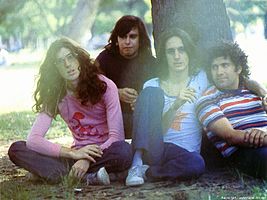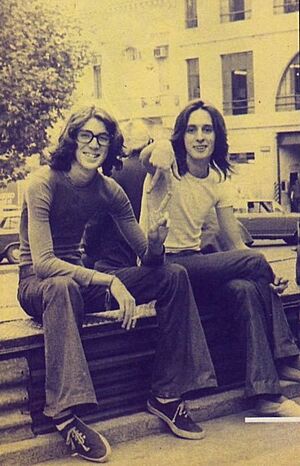Sui Generis (band) facts for kids
Quick facts for kids
Sui Generis
|
|
|---|---|

Sui Generis in 1974. From left to right: Charly García, Juan Rodríguez, Nito Mestre and Rinaldo Rafanelli.
|
|
| Background information | |
| Origin | Buenos Aires, Argentina |
| Genres | Folk rock, progressive rock |
| Years active | 1971–1975 2001–2002 |
Sui Generis was a super popular rock band from Argentina. They were famous in the 1970s and still have many fans today across South America. Their songs were about being young and became like anthems for many generations of Argentines. People still sing them at parties!
Charly García wrote most of their music. Their style changed over time. At first, it was simple folk music with guitar, piano, and flute. Later, it became more like progressive rock with bigger sounds. Sui Generis broke up on September 5, 1975, after a huge concert. Even though they played a few times later, they never fully got back together.
Contents
How Sui Generis Started
Sui Generis began in 1969. It was formed when two bands joined together. One band was called To Walk Spanish, led by Charly García. The other was The Century Indignation, led by Nito Mestre.
At first, the new band had more members: Charly (piano), Nito (flute), Alberto Rodríguez (drums), Alejandro Correa (bass guitar), Juan Carlos Bellia (guitar), and Carlos Piégari (guitar and vocals).
The band tried out different sounds, including psychedelic music. But they soon found their own style, which is now called folk-rock. At their first big show, only Charly and Nito showed up! They decided to play anyway. Charly played piano, and Nito played flute. The audience loved them, even with just two people. Their simple songs about being a teenager were very poetic. After this, Charly and Nito decided to continue as a duo. Charly wrote the songs and played piano, while Nito played flute. Both sang and played guitar.
Soon after, Charly, who was 20, had to pause from the band for a short time. During this time, he wrote two of their most famous songs: "Botas Locas" (Crazy Boots) and "Canción para mi muerte" (Song for my death).
In 1972, Sui Generis released their first album, Vida (Life). It became very popular, especially with teenagers in Argentina. Their second album, Confesiones de Invierno (Winter Confessions), came out in 1973. This album sounded even better and was also a big hit.
A New Sound for the Band
In 1974, things changed for Sui Generis. Charly García wanted a different sound. He was tired of just the piano and flute. He wanted a more traditional rock sound with bass and drums. So, they added Rinaldo Rafanelli on bass and Juan Rodríguez on drums.
Their new album was called Pequeñas Anécdotas sobre las Instituciones (Little Anecdotes about Institutions). Charly wanted to write songs about important parts of society, like the government or the police. However, some songs had to be changed or removed because of the political situation at the time. For example, "Juan Represión" (John Repression) and "Botas Locas" (Crazy Boots) were taken off the album. Other songs about censorship also had to be changed.
Even though Charly created a new, more grown-up sound, many fans didn't like the change. They preferred the old folk-rock style. Because of this, the album did not sell as well.
The End of Sui Generis
Charly kept writing songs in 1975 for a new album called Há sido (Has been). But the band members started having problems. Nito Mestre wasn't happy with the new style. The new band members weren't popular with the fans. And Charly was tired of the old Sui Generis style that everyone wanted.
The Há sido album was never officially recorded. However, some of its songs, like "Bubulina" and "Eiti Leda," were played at their farewell concert.
Finally, on September 5, 1975, Sui Generis played their last shows at the Luna Park Stadium. Two concerts were held for 20,000 people. This was the biggest rock concert in Argentina at that time.
In 1976, some of the Sui Generis members recorded an album with other Argentine musicians, León Gieco and Raúl Porchetto. This album was called Porsuigieco, which was a mix of their names.
Albums by Sui Generis
Here are some of the albums Sui Generis released:
Studio Albums
- Vida (1972)
- Confesiones de invierno (1973)
- Pequeñas anécdotas sobre las instituciones (1974)
- Sinfonías para adolescentes (2000)
Live Albums
- Adiós Sui Generis (1975)
- Adiós Sui Generis, parte II (1995)
- Adiós Sui Generis, parte III (1995)
- Si - Detrás de las paredes (2001)
Compilation Albums
- Antología (1992)
Images for kids
See also
 In Spanish: Sui Generis (banda) para niños
In Spanish: Sui Generis (banda) para niños
 | Stephanie Wilson |
 | Charles Bolden |
 | Ronald McNair |
 | Frederick D. Gregory |




